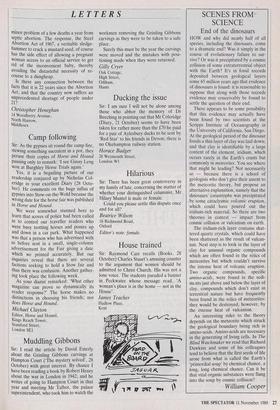SCENES FROM SCIENCE
End of the dinosaurs
HOW and why did nearly half of all species, including the dinosaurs, come to a dramatic end? Was it simply in the course of evolutionary failure to sur- vive? Or was it precipitated by a cosmic collision of some extraterrestrial object with the Earth? It's in fossil records deposited between geological layers some 65 million years ago that evidence of dinosaurs is found: it is reasonable to suppose that along with those records evidence may conceivably be found to settle the question of their end.
There appears to be some possibility that this evidence may actually have been found by two scientists at the Scripps Institute of Oceanography in the University of California, San Diego. At the geological period of the dinosaur fossils a thin layer of clay was laid down; and that clay is identifiable by a large content of the element, iridium, which occurs rarely in the Earth's crusts but commonly in meteorites. You see where that might be leading? Not necessarily so — because there is a school of geologists who don't give their assent to the meteorite theory, but propose an alternative explanation, namely that the dinosaurs' catastrophe was precipitated by some cataclysmic volcanic eruption, which could have poured out the iridium-rich material. So there are two theories in contest — impact from cosmic collision or vulcanism on earth.
The iridium-rich layer contains shat- tered quartz crystals, which could have been shattered as the result of vulcan- ism. Next step is to look in the layer of clay for unusual organic compounds which are often found in the relics of meteorites but which couldn't survive the intense heat of volcanic eruption. Two organic compounds, specific amino-acids, were found in the sedi- ments just above and below the layer of clay, compounds which don't exist in terrestrial nature but have frequently been found in the relics of meteorites: they would be destroyed, however, by the intense heat of vulcanism.
An interesting rider to the theory depends on the meteorite which struck the geological boundary being rich in amino-acids. Amino-acids are necessary in the generating of living cells. In The Blind Watchmaker we read that Richard Dawkins and some of his colleagues tend to believe that the first seeds of life arose from what is called the Earth's `primordial soup' by chemical chance, a long, long chemical chance. Can it be that vital organic substances were flung into the soup by cosmic collision?
William Cooper










































































 Previous page
Previous page